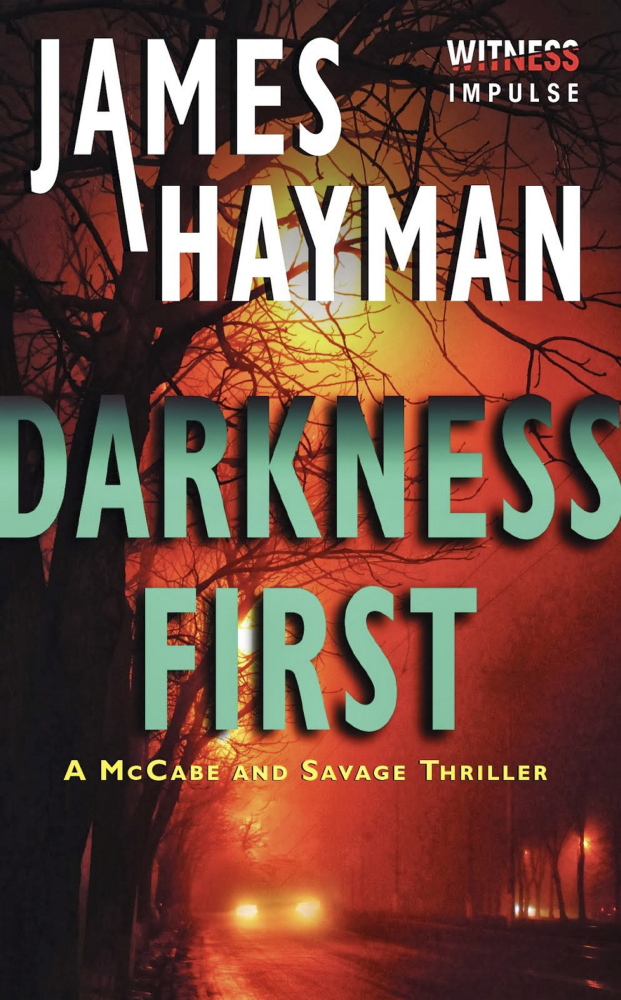It doesn’t take long for readers to sense that they’re in confident hands in James Hayman’s new thriller, “Darkness First.” The prologue is coldly atmospheric, set in the middle of a dark January night aboard a boat adrift in the Bay of Fundy. The man aboard is scanning the vast darkness of the bay with binoculars, searching for his two companions.
They finally appear in an inflatable kayak and come aboard. The two paddlers are overjoyed at the cache of Oxycontin tablets worth nearly $5 million in street value that they’ve just heisted from a Canadian drug company. Before the kayakers become too comfortable in their newfound fortune, however, they’re ordered by the skipper to strip and jump into the frigid water. Odds don’t favor them surviving in a swim to shore. But at least it’s a chance. It’s that or be shot. Complaining bitterly, they jump.
The skipper waits until he can no longer hear or see them thrashing in the icy bay, then carefully takes the weapon one of them used to kill the night guard at the drug firm, handling it with latex-gloved hands, and drops it along with the men’s wallets into the inflatable. He sets it adrift on the tide, evidence and identification of the culprits all neatly packaged for those who’ll soon be investigating the crime.
Before another 30 pages unfolds, a young woman, Tiffany Stoddard, bruised and beaten, shows up late one evening at a doctor’s office in Machiasport begging for an abortion. Things don’t go the way she wants and she flees. Minutes later, she’s being viciously assaulted by a man who’d been hiding in wait for her where she’d left her car. Concerned, Dr. Emily Kaplan appears, having followed Stoddard, arriving just as the attacker – the same man from the boat – slits Tiffany’s throat. He then gets in his car and runs Kaplan down.
Portland author James Hayman’s story craft in the opening of “Darkness First” is taut, the pacing tight, the horror enacted in the darkness vibrant with grisly tension. And he’s only getting started.
Dr. Kaplan, left in the road for dead, ends up in intensive care. By dawn, her best friend from childhood, Maggie Savage – Det. Savage with the Portland Police Department – arrives after driving all night Down East, prompted by a phone call from her father, who happens to be the Washington County sheriff. Maggie manages to finagle her way into the state police investigation, miffing some and showing up everyone else for her prowess as a smart, resourceful investigator.
The plot turns around the search to identify the shadowy killer and drug dealer who is responsible for a major flow of illegal drugs out of Canada into Maine and points south. He’s known only as Conor Riordan. Riordan is truly a shadow, however. He has no history whatsoever and has left no clues to reveal his true identity.
Hayman does not let up in his nearly faultless plotting or in his depiction of an incredible cast of characters. With Maggie, what you see is what you get. Her father and her partner from Portland are likewise steadfast characters. With most of the others, it’s difficult to tell the good guys from the bad.
Central to the story’s end game is Tabitha Stoddard, the little sister of the pregnant victim. She starts out as a shy observer, on the periphery. But she unwittingly becomes the focus of the killer’s ultimate hunt to recover the money and drugs that big sister Tiffany stole from him. Tabitha’s story is filled with tragic pathos, which greatly tightens the tension and urgency that drives Det. Maggie Savage.
Hayman is among Maine’s best mystery/thriller writers today. The subtly of his skill is so fine that he makes it seem effortless. “Darkness First” is his third novel. It was originally released as an eBook last fall. After 20 years as artistic director at a New York advertising agency, Hayman’s move to Portland to write has been fortuitous for both him and for readers alike. It’s clear he has found his true calling.
Frank O Smith is a Maine writer whose novel, “Dream Singer,” was a finalist for the Bellwether Prize, created by best-selling novelist Barbara Kingsolver “in support of a literature of social change.” “Dream Singer” will be published this summer. Smith can be reached via www.thewritinggroup.com.
Send questions/comments to the editors.



Comments are no longer available on this story